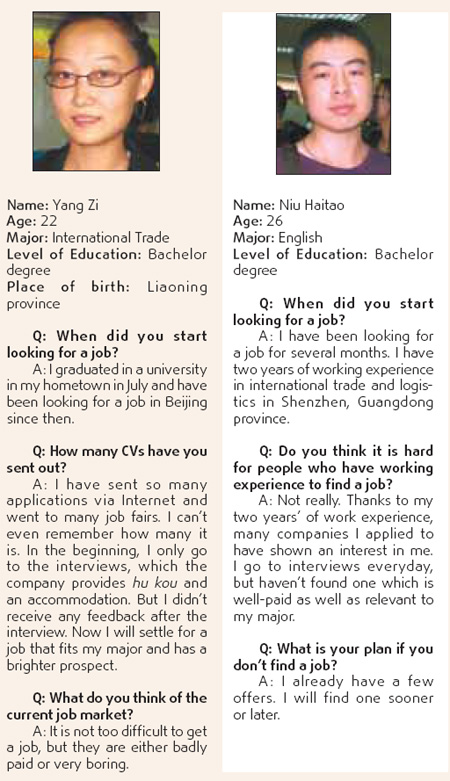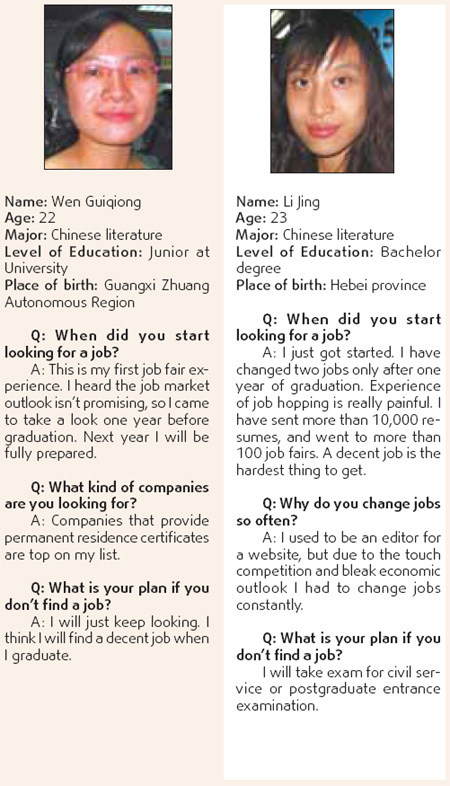
|
Metro> Education
 |
|
'Sea turtles' getting ready for career success
By Wang Wei (China Daily)
Updated: 2009-09-28 09:13 Ji Lingjie, a senior student from University of International Business and Economics, turned down a postgraduate recommendation from her school because she is determined to continue her postgraduate studies at a university in Hong Kong. Ji, a major in translation, beat some 120 students in the English department, and became one of only three students who received the recommendation. "I don't feel any regret at all," she says. "Studying outside the Chinese mainland will not only offer me a better diploma but also give me a different perspective of the world." It has been a trend for young graduates, like Ji Lingjie, to go outside Chinese mainland to study. Some analysts and officials in the education sector estimated approximately 300,000 students will study abroad in 2009, almost double the amount compared to last year. In the coming three to five years, the figure will reach 1 million, according to sina.com. The frenzied rush of millions of students going abroad to study has driven some related industries to develop swiftly. On a Thursday morning, Beijing Jinjilie Overseas Education Consulting and Services agency, one of the first of education service agencies to set up in China, was packed with parents and students, seeking the dream of studying abroad. Jinjilie marketing manager Han Zhijun said this year's business has risen 70 percent compared to the same period last year. "There are primarily three reasons for young graduates to choose study overseas," Han told METRO. "Firstly, living costs and tuition fee in foreign countries have been reduced considerably due to worldwide economic turmoil. Secondly, it is relatively easy to get a visa at the moment. Thirdly, education quality in developed countries is far better than in China." Wang Jie, a graduate from Beijing University of Posts and Telecommunications (BUPT), said about 80 percent of the senior students in the business administration department of BUPT International School have decided to study overseas. Wang majored in e-commerce, and said he was applying for a one-year-postgraduate program in Britain. He used it as a gateway to go to a prestigious university in the US to get a doctor degree. "I will try to find a part-time job to cover some expenses, but my parents are the ones to pay tuition and other costs," Wang said. The US and the UK are among the most popular destinations for graduates, who want to study abroad. One year self-financing postgraduate program in US is approximately 300,000 yuan ($42,000). However, as more and more people study abroad, "sea turtles" (hai gui in Chinese, meaning returnees after studying abroad) are not so popular as before. They acquire a new name - "sea weeds," or hai dai in Chinese, which is a shortened form of hai gui dai ye, or "returned from overseas and waiting for a job." In 2007, research was conducted on Chinese students who had studied abroad and results revealed that 65 percent hai gui believed their employment situation was gloomy. The survey showed that 60 percent of enterprises had a bad impression toward "sea turtles". A spokesperson for one of the world's largest IT management software providers, CA, said students trained in China with a strong educational background were preferable over sea turtles. "Most of sea turtles have limited and immature understanding of Chinese society, and they often have high expectation in salary and position," the spokesman, who works in the company's human resources department, said. Experts attribute the unpopularity for "sea turtles" to the fact that, with domestic education gradually adapting to international practices, students trained in China have become more competitive in the job market.

 |